Profile
I am a cultural geographer with research interests spanning geographies of belief, contemporary engagements with the past, and intimate geographies of belonging, identity and home. Prior to conducting academic research, I spent many years as a journalist where I specialised in urban regeneration and environmental change; my turn to geographical work emerged as a way of exploring in more depth the many questions which arose for me during this period.
The Domestic Uncanny: My interest in how people develop and maintain senses of home, belonging and relatedness led to a project exploring how people negotiate a ‘co-habitation’ with ghosts and the uncanny. This allowed me to gain insights into how people negotiate senses of home which is ‘shared’ by unknown others; the relationship between the material spaces of the domestic interior and ‘immaterial’, evasive and uncertain events; and the way people interpret these events in relation to their experiences and prior beliefs. The research resulted in a monograph, published in 2014.
Living with the Past at Home: I extended my research on the Domestic Uncanny to consider more broadly people’s experience of the ‘presence of the past’ within their homes. The AHRC-funded project, ‘Living with the Past at Home: domestic prehabitation and inheritance’, investigates the meanings, knowledges, practices and material dimensions of living with the past at home. It considers the significance of people's awareness of previous inhabitants, or that deemed to be inherited from them, in framing domestic belonging, ownership, and aesthetic expression in the home, and the forms of historical knowledge and historical practice that are prompted, informed by and result from this awareness. I am currently writing up the insights from this project in journals papers and a second monograph.
Sites of burial and memorialisation: In 2011 I received a Barnett Shine Fellowship to research and write a history of the Sephardic Jewish Cemeteries at Queen Mary, which was published as a book in 2012. I am continuing my interest in the cemeteries by, firstly, developing learning and web resources for the college; secondly, using my expertise in the history of the cemeteries as a teaching tool; and, thirdly, by undertaking further research on the broader implications of recent contestations over these sites. Separately, I have also written on the history and place of urban ‘house museums’ and wish to extend this work to explore the political role of museums in recreating urban identity in the aftermath of war.
Urban folk geographies: My next major project will bring together my interests in alternative and vernacular beliefs, contemporary heritage, and geographies of belonging to explore how: 1. folk memories and mythologies can shed light on affective responses to place, in particular anxieties around environmental, social and economic change; and 2. How alternative beliefs remap urban space. I will investigate how the reinvention of myths about place can be mobilised in contemporary political discourse. This project also builds upon previous ethnographic work on urban exploration (at an abandoned hospital at Taplow: the Canadian Red Cross Memorial Hospital) and signals my continuing interest and critical engagement in urban psychogeographies.
Research
Research Interests:
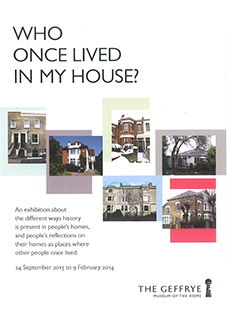 Living with the past at home: domestic pre-habitation and inheritance
Living with the past at home: domestic pre-habitation and inheritance
This project extends recent work on the cultural geographies of everyday domestic spaces and forms of public history by addressing how the past is imaginatively reconstructed and experienced in the home. It takes up an archaeological focus on ‘pre-habitation’ – which concerns the investigation of once-inhabited places where traces of habitation remain – to explore the experiences, meanings, knowledges, attitudes, practices and material dimensions associated with senses of domestic pre-habitation and inheritance in Britain.
Funded by the Arts and Humanities Research Council, AH/I022090/1(£291,336). PI: Catherine Nash
Publications
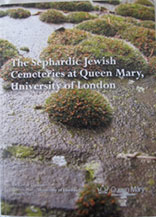 Lipman C (2014): Co-habiting with Ghosts: knowledge, experience and belief and the domestic uncanny. Ashgate Publishing (240 pages)
Lipman C (2014): Co-habiting with Ghosts: knowledge, experience and belief and the domestic uncanny. Ashgate Publishing (240 pages)- Lipman C (2012): The Sephardic Jewish Cemeteries at Queen Mary, University of London. QMUL Publications (102 pages)
Reviews for ‘Co-habiting with Ghosts’:
- ‘[An] extraordinary book … rich in testimony, ever sensitive to people’ experience’ (Steve Pile, OU)
- ‘[Lipman] challenges much current thinking about home and subjectivity in this highly original and beautifully written book’ (Ann Varley, UCL)
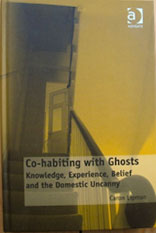 ‘Through the painstaking relaying of people’s experiences, emotions and affects, Lipman shows how cohabiting with ghosts is something which we comprehend and make sense of with reference to previous understandings and experiences. She manages to weave an informative and illuminating path through people’s carefully orchestrated attempts to define, explain and make tangible the inexplicable and intangible … She shows how [ghosts’] extraordinary presence is incorporated in very ordinary ways and becomes an intrinsic part of people’s everyday domestic geographies … There is something rather magical about the way in which this book makes the extraordinary and the inexplicable very ordinary and acceptable … A convincing, informative and entertaining read … Beautifully refreshing’ (Sara MacKian, OU)
‘Through the painstaking relaying of people’s experiences, emotions and affects, Lipman shows how cohabiting with ghosts is something which we comprehend and make sense of with reference to previous understandings and experiences. She manages to weave an informative and illuminating path through people’s carefully orchestrated attempts to define, explain and make tangible the inexplicable and intangible … She shows how [ghosts’] extraordinary presence is incorporated in very ordinary ways and becomes an intrinsic part of people’s everyday domestic geographies … There is something rather magical about the way in which this book makes the extraordinary and the inexplicable very ordinary and acceptable … A convincing, informative and entertaining read … Beautifully refreshing’ (Sara MacKian, OU)
Journal articles
- Lipman C and Sheringham O (2016): ‘Restor(y)ing Home: Reflections on Stories, Objects and Space in BalinHouseProjects’. In T Khonsari (ed): My Home is Your Home. London: Public Works Publishing
- Blunt A, John E, Lipman C and Owens A (2013): ‘Centre for Studies of Home: a partnership between Queen Mary, University of London and the Geffrye Museum of the Home’, in, eds. Craggs R, Geoghegan H and Keighren I, Collaborative Geographies: the politics, practicalities, and promise of working together. Royal Geographical Society (with the Institute of British Geographers), Historical Geography Research Series, number 43: 111-125
- Blunt A, Bonnerjee J, Lipman C, Long J and Paynter F (2007): ‘My Home: space, text and performance’. Cultural Geographies 14: 309-318
- Lipman C, ‘The Emotional Self’ (2006): Cultural Geographies 13: 617-62
Public Engagement
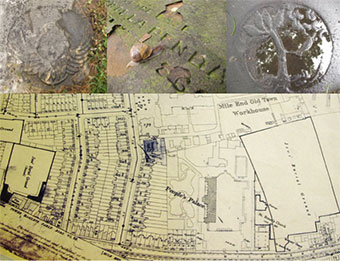 The Novo and Velho Cemeteries, Mile End
The Novo and Velho Cemeteries, Mile End
My work on the Sephardic Jewish Cemeteries at Queen Mary has led me to take part in a number of public engagement initiatives, including an English Heritage consultation. I have given numerous talks and guided walks for a range of different people. I have also received funds to disseminate and extend knowledge about the cemeteries through web-based maps and outreach activities.
Geffrye Museum: exhibition curation and collaboration
 As part of the Living with the Past at Home project, I co-curated an exhibition at the Geffrye Museum of the Home, London, called Who Once Lived in My House? exhibition (2014). Collaborative work with the Geffrye Museum also included organising a series of public talks and workshops.
As part of the Living with the Past at Home project, I co-curated an exhibition at the Geffrye Museum of the Home, London, called Who Once Lived in My House? exhibition (2014). Collaborative work with the Geffrye Museum also included organising a series of public talks and workshops.
I also produced the feasibility study which led to the creation of the Centre for Studies of Home, a partnership between the Geffrye Museum and QMUL, and have been a committee member for the Centre.
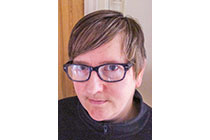
 Living with the past at home: domestic pre-habitation and inheritance
Living with the past at home: domestic pre-habitation and inheritance Lipman C (2014): Co-habiting with Ghosts: knowledge, experience and belief and the domestic uncanny. Ashgate Publishing (240 pages)
Lipman C (2014): Co-habiting with Ghosts: knowledge, experience and belief and the domestic uncanny. Ashgate Publishing (240 pages) ‘Through the painstaking relaying of people’s experiences, emotions and affects, Lipman shows how cohabiting with ghosts is something which we comprehend and make sense of with reference to previous understandings and experiences. She manages to weave an informative and illuminating path through people’s carefully orchestrated attempts to define, explain and make tangible the inexplicable and intangible … She shows how [ghosts’] extraordinary presence is incorporated in very ordinary ways and becomes an intrinsic part of people’s everyday domestic geographies … There is something rather magical about the way in which this book makes the extraordinary and the inexplicable very ordinary and acceptable … A convincing, informative and entertaining read … Beautifully refreshing’ (Sara MacKian, OU)
‘Through the painstaking relaying of people’s experiences, emotions and affects, Lipman shows how cohabiting with ghosts is something which we comprehend and make sense of with reference to previous understandings and experiences. She manages to weave an informative and illuminating path through people’s carefully orchestrated attempts to define, explain and make tangible the inexplicable and intangible … She shows how [ghosts’] extraordinary presence is incorporated in very ordinary ways and becomes an intrinsic part of people’s everyday domestic geographies … There is something rather magical about the way in which this book makes the extraordinary and the inexplicable very ordinary and acceptable … A convincing, informative and entertaining read … Beautifully refreshing’ (Sara MacKian, OU) The Novo and Velho Cemeteries, Mile End
The Novo and Velho Cemeteries, Mile End As part of the Living with the Past at Home project, I co-curated an exhibition at the Geffrye Museum of the Home, London, called Who Once Lived in My House? exhibition (2014). Collaborative work with the Geffrye Museum also included organising a series of public talks and workshops.
As part of the Living with the Past at Home project, I co-curated an exhibition at the Geffrye Museum of the Home, London, called Who Once Lived in My House? exhibition (2014). Collaborative work with the Geffrye Museum also included organising a series of public talks and workshops.